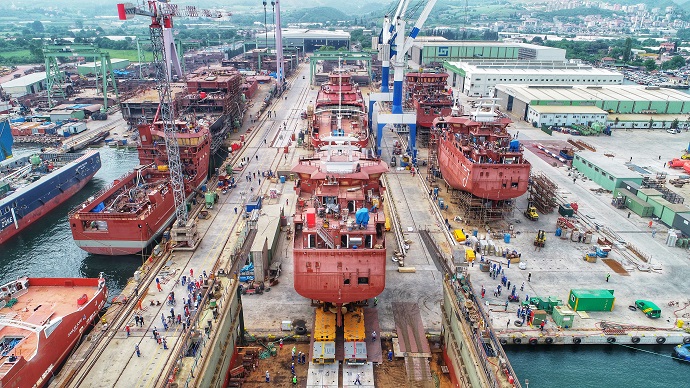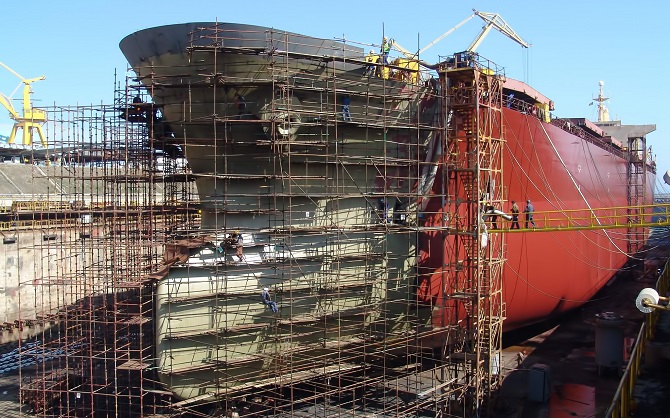Basic Liabilities of the Parties Under Ship Building Contracts
Ship building contracts are agreements between shipbuilders and ship owners or operators that outline the design, construction, and delivery of a new ship. These contracts are critical for ensuring that both parties have a clear understanding of the project scope, timeline, and costs, and that the final product meets the required specifications.
There are several types of ship building contracts:
Fixed price contracts: In this type of contract, the shipbuilder agrees to build the ship for a fixed price, regardless of any cost overruns or delays. This type of contract is typically used when the ship owner or operator has a clear understanding of the ship's design and specifications and is willing to assume the risk of any cost overruns.
Cost-plus contracts: Under this type of contract, the shipbuilder is reimbursed for the actual cost of building the ship, plus an agreed-upon profit margin. This type of contract is often used when the ship owner or operator is not sure of the exact design and specifications of the ship, and wants the shipbuilder to assume some of the risk.
Design-build contracts: This type of contract combines the design and construction phases of the ship building process. The shipbuilder is responsible for both designing and building the ship, with the ship owner or operator only responsible for providing the overall specifications.
Turnkey contracts: In this type of contract, the shipbuilder is responsible for designing, building, and delivering the ship to the ship owner or operator, ready to be used.
Ship building contracts can also include clauses for warranties, maintenance, and training. These clauses ensure that the shipbuilder is responsible for any defects or issues that arise with the ship during a specified period after delivery, and that the ship owner or operator is trained on how to properly operate and maintain the ship.
1.Legal Nature of Shipbuilding Contracts
The legal nature of shipbuilding contracts is a complex and nuanced topic that is shaped by a variety of international and national laws and regulations. These contracts are considered to be commercial agreements between the shipyard and the ship owner, and are governed by the law of contract.
Shipbuilding contracts have been regarded as contracts for the sale of goods in Sale of Goods Act 1979. In English Law, the contract of sale is divided into two groups as outright sale and agreements to sell. In Agreements to sell, the ownership of the goods transferred to the buyer at a later time or after the fulfillment of a condition. In the doctrine, it is accepted that the shipbuilding contract is in the nature of the sale of future goods.(1)
More recently, principally following two decisions of the House of Lords in Hyundai Heavy Industries Co v Papadopoulos and Others (1980) and Stocznia Gdanska SA v Latvian Shipping Co, Latreefer Inc and Others (1998), the position has been somewhat refined by the recognition that the shipbuilding contract is not just one of sale alone but also resembles a construction contract. Accordingly, the current preferred view is that a shipbuilding contract in English law should be categorised as a contract of sale of goods (more precisely categorised under the Sale of Goods Act 1979 as an agreement to sell future goods by description) containing certain characteristics of a construction contract.(2)
According to Turkish Law, the nature of shipbuilding contracts is controversial in the doctrine. In the doctrine, shipbuilding contracts are considered to be a contract of work or contract of sale. However, the Supreme Court (Yargıtay) accepts that the legal nature of the shipbuilding contracts are the contract of work and services. In shipbuilding contracts, the shipbuilder is obliged to build and deliver the ship. The shipowner, on the other hand, is under the obligation to pay the shipbuilding price.(3)
One of the key elements of the legal nature of shipbuilding contracts is the requirement for a clear and binding agreement between the parties. This includes specifying the design and specifications of the ship, the materials to be used, the delivery date, and the price. These terms must be agreed upon by both parties and must be clearly outlined in the contract.
Another important aspect of the legal nature of shipbuilding contracts is the requirement for performance. This means that both the shipyard and the ship owner must fulfill their obligations under the contract. The shipyard must construct the vessel to the agreed upon specifications and deliver it on time, while the ship owner must pay the agreed upon price.
In terms of Turkish Law, Shipbuilding contracts are synallagmatic contracts that the performances and obligations of the parties constitute the equivalent of each other.(4)
In terms of Turkish Law, the shipbuilding contract is accepted as contract of instantaneous performance. A contract is established with the consent of the parties and the declarations of will that are explained in accordance with each other. Therefore, the shipbuilding contract is accepted as consensu contrahitur.
2. Obligations of the Parties
Under a shipbuilding contract, both the shipyard and the ship owner have specific obligations that they must fulfill in order to ensure the successful construction and delivery of a vessel.
The shipyard's primary obligation is to construct the vessel to the agreed-upon specifications and deliver it on time. This includes using the specified materials, following the agreed-upon design, and meeting any other requirements outlined in the contract. The shipyard is also responsible for obtaining any necessary permits and licenses, and for complying with all relevant laws and regulations. In case of any delay, shipyard may face penalties as per the contract.
The shipyard also has an obligation to maintain the confidentiality of any confidential information provided by the ship owner, such as trade secrets or proprietary information. This is an important aspect of shipbuilding contracts as it can protect the ship owner's competitive advantage in the market.
The ship owner, on the other hand, has an obligation to pay the agreed-upon price for the vessel and to provide any necessary information or materials to the shipyard. The ship owner must also comply with any other requirements outlined in the contract, such as providing access to the vessel during construction or arranging for the delivery of the vessel.
The ship owner also has a duty to inspect the ship at different stages of the construction process and give notice to the shipyard of any defects or nonconformities, before taking delivery. This helps ensure that the ship is built to the agreed-upon specifications and that any issues are addressed before delivery.
Additionally, both the shipyard and the ship owner have an obligation to cooperate with each other and to resolve any disputes that may arise during the construction and delivery of the vessel. This may include utilizing any dispute resolution mechanisms outlined in the contract, such as arbitration or court litigation.

2.1. Shipyard Obligations Under the Shipbuilding Contracts
Shipbuilding contracts outline specific obligations for shipyards in the construction and delivery of a vessel. These obligations are governed by the law of contract, which sets out the rights and responsibilities of the parties involved.
One of the primary obligations of a shipyard under a shipbuilding contract is to construct the vessel to the agreed-upon specifications and deliver it on time. This includes using the specified materials, following the agreed-upon design, and meeting any other requirements outlined in the contract. The shipyard is also responsible for obtaining any necessary permits and licenses, and for complying with all relevant laws and regulations.
In the event of delay, the shipyard may be liable to pay liquidated damages to the ship owner, as specified in the contract. This serves as an incentive for the shipyard to complete the construction and delivery of the vessel on time. Additionally, if the shipyard fails to deliver the vessel within the time frame provided in the contract, the ship owner may have the right to terminate the contract and seek damages.
The shipyard also has an obligation to maintain the confidentiality of any confidential information provided by the ship owner, such as trade secrets or proprietary information. This is an important aspect of shipbuilding contracts as it can protect the ship owner's competitive advantage in the market.
Furthermore, the shipyard has a duty to exercise reasonable skill and care in the construction of the vessel and to use materials of good quality.
Shipbuilding contracts commonly set out performance standards for the speed, fuel consumption and deadweight of the vessel. If any of these agreed performance standards are not met when tested during sea trials, the contract will typically allow a small percentage of agreed deficiency but thereafter the buyer will be entitled to liquidated damages, often tiered depending on the extent of the deficiency.(5)
The shipyard is also under a duty to provide an opportunity for the ship owner to inspect the vessel during the construction process and give notice to the shipyard of any defects or non-conformities.
Additionally, both the shipyard and the ship owner have an obligation to cooperate with each other and to resolve any disputes that may arise during the construction and delivery of the vessel. This may include utilizing any dispute resolution mechanisms outlined in the contract, such as arbitration or court litigation.

2.2. Shipowner Obligations Under the Shipbuilding Contracts
In the context of English law, shipbuilding contracts outline specific obligations for ship owners in the construction and delivery of a vessel. These obligations are governed by the law of contract, which sets out the rights and responsibilities of the parties involved.
One of the primary obligations of a ship owner under a shipbuilding contract is to pay the agreed-upon price for the vessel and to provide any necessary information or materials to the shipyard. The ship owner must also comply with any other requirements outlined in the contract, such as providing access to the vessel during construction or arranging for the delivery of the vessel.
The ship owner also has a duty to inspect the ship at different stages of the construction process and give notice to the shipyard of any defects or nonconformities, before taking delivery. This helps ensure that the ship is built to the agreed-upon specifications and that any issues are addressed before delivery.
Additionally, the ship owner has a responsibility to provide the shipyard with accurate and complete information about the vessel's intended use, operating conditions and any other specific requirements to enable the shipyard to design and construct the vessel accordingly.
Furthermore, ship owner has an obligation to take delivery of the vessel when it is ready and in accordance with the terms of the contract. The ship owner is also obligated to pay the final balance of the price of the vessel on or before delivery.
The ship owner also has an obligation to maintain the confidentiality of any confidential information provided by the shipyard, such as trade secrets or proprietary information. This is an important aspect of shipbuilding contracts as it can protect the shipyard's competitive advantage in the market.
Kaynaklar:
1- Cem Congar, Gemi İnşa Sözleşmeleri, Seçkin Hukuk, İstanbul, 2023,p. 47
2- Haynes and Boone LLP (2019), Contractual considerations for shipbuilding in United Kingdom - England & Wales, Retrived from https://www.lexology.com/library/detail.aspx?g=a2631968-92c6-4d64-85e7-201a8cd3695b
3- Cem Congar, Gemi İnşa Sözleşmeleri, Seçkin Hukuk, İstanbul, 2023,p. 50
4- Cem Congar, Gemi İnşa Sözleşmeleri, Seçkin Hukuk, İstanbul, 2023,p. 50
5- Haynes and Boone LLP (2019), Contractual considerations for shipbuilding in United Kingdom - England & Wales, Retrived from https://www.lexology.com/library/detail.aspx?g=a2631968-92c6-4d64-85e7-201a8cd3695b
















YAZIYA YORUM KAT
Türkçe karakter kullanılmayan ve büyük harflerle yazılmış yorumlar onaylanmamaktadır.